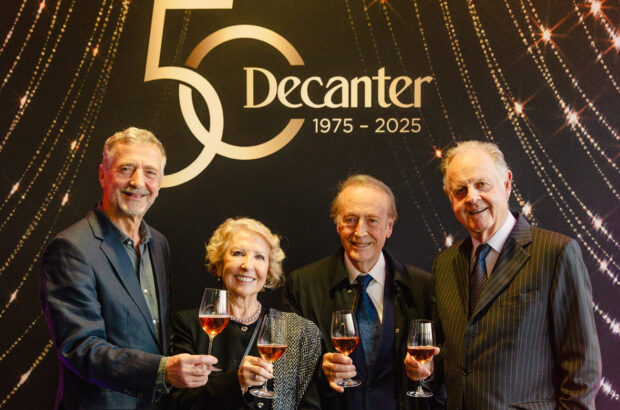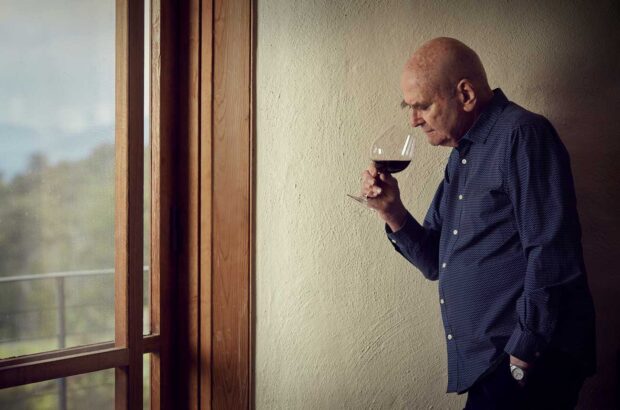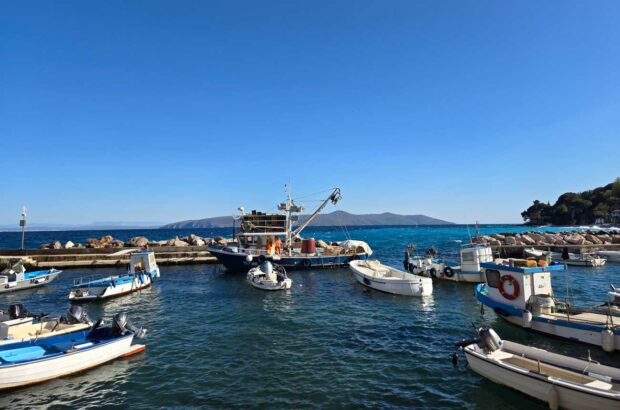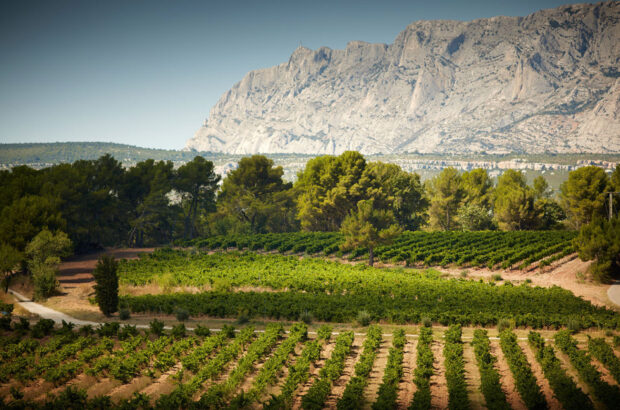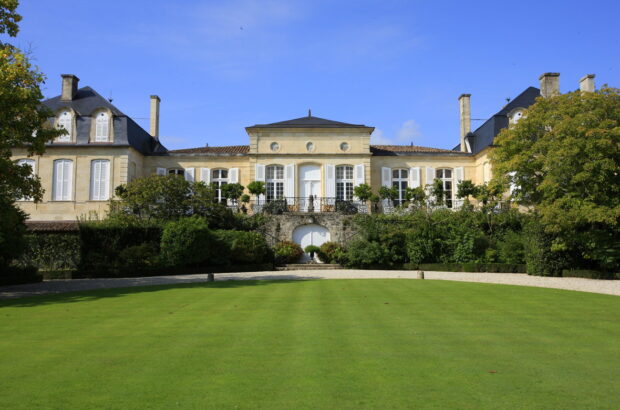It’s 11.00am on a July day and it’s already hot in Gigondas. The cicadas are trilling in the plane trees that shade the village square. A busy day is looming for Alexandre Fréguin but he remains unfazed, looking relaxed in a smart shirt and sandals. Underneath the calm exterior however there’s a single-minded determination that would put the Terminator to shame. At just 34, he’s achieved more than most sommeliers manage in a lifetime.
Fréguin oversees the drinks program across the network of restaurants and bars in Gigondas that belong to the Perrin family, owners of Château de Beaucastel and Domaine du Clos des Tourelles. It will come as no surprise that they take wine very seriously here. The main wine list, which is shared across the sites, features 3,500 different wines, mostly from the Rhône.
From law to wine
Fréguin grew up in Aix-en-Provence and was initially destined for a very different career. ‘All my family went to law university; I had no choice whatsoever. My dad said, “you’re going to be a lawyer.” And that was that!’ After school, he dutifully enrolled.
‘My connection with wine happened late one night in a nightclub,’ Fréguin explains. He made friends with someone whose mother owned a small wine estate making rosé in Aix. The following morning, they met up to visit the estate and spend a day helping out around the winery.
It turned into a hobby; cleaning tanks, delivering wines, attending wine fairs…Alex was smitten. ‘I’m serving wine to people, I’m having wine for lunch, a little apéritif at in the evening – it’s the good life!’ Studying law began to look less appealing.
‘After two years of university, I went to see my dad and said “I want to work in the wine industry.” He said “fine, do it, but I’m not talking to you anymore.” We didn’t talk to each other for more than two years, not even at Christmas.’
If he was going to get back in his father’s good books, he was going to have to prove himself.
First steps on the floor
With little work experience, no qualifications and no income, Fréguin found reality starting to bite. He got a job at a neighbourhood bistro, where it quickly became clear that he’d lied on his CV, as he had no idea what he was doing. But he worked hard, and they got on well. Soon he felt like part of the family.
The next step was to enrol at culinary school. He excelled, and managed to secure work experience at a restaurant with a Michelin star. He abandoned his studies to concentrate on work, and by the age of 24 he was offered the role of head sommelier at one-star Michelin Les Loges, in the Cour des Loges hotel in Lyon.
Soon after he started there, the phone rang. ‘I remember exactly where I was,’ says Fréguin. ‘I hear you’re doing well,’ said his father, on the other end. They now have a warm relationship, and share a mutual passion for wine.
See Matt Walls’ southern Rhône 2021 full report
To England
‘I wanted to challenge myself, to go to the next level – to a two-star Michelin restaurant. To push my boundaries, to go abroad,’ says Fréguin. He successfully applied for a sommelier position at L’Enclume in the Lake District in the north of England.
‘When I first opened the wine list at L’Enclume, I realised I knew nothing. The list had wines from all over the world. I realised in France we have very good sommeliers, but these guys [in the UK] are way above! That’s what I loved about being in the UK, the diversity.’
The head chef was Mark Birchall. ‘At the time I thought he was horrible! Rough, always shouting,’ says Fréguin. ‘But he had a golden touch… it was impressive how sharp he was.’ Birchall was planning on opening his own restaurant, and told Fréguin he wanted him on board.
They opened Moor Hall in Ormskirk, Lancashire, in 2017. Within 18 months, it had been awarded two Michelin stars and numerous other accolades.
Competition time
The year Moor Hall opened was the same year Fréguin first entered the UK Sommelier of the Year competition. He’d never entered a competition of this nature before, so he was surprised to do so well. ‘I reached the semi-finals, but when I saw the other competitors, I freaked out! I couldn’t even say hello to them. It was Gerard Basset MW MS, Eric Zwiebel MS, Nicolas Clerc MS… all the people I admired. I wanted to die!’
The sommelier community in the UK is a supportive one, and his fellow competitors soon became friends and mentors. He entered the following year, and this time he claimed the title.
Soon after, he took a position at Chez Bruce in south London where he met his partner Virginie Ramit, with whom he has a son, Noah. They were already considering leaving London when the Covid pandemic struck, which cost them their jobs. Craving space, they decided to move back to their home country.

Le Bistrot de L’Oustalet. Credit: www.loustalet-gigondas.com
To Gigondas
On arriving back in France, Fréguin received an email from Charles Perrin who was looking for somebody to manage the drinks operation in Gigondas: the Perrins own the one-star Michelin L’Oustalet, Le Bistrot de L’Oustalet, and a wine bar and shop called Nez.
Originally Fréguin took the head sommelier position at L’Oustalet to see how good a fit they were. Now he supervises all three establishments, running a team of six sommeliers, though buying the wine is his main focus.
The head chef when he joined was Laurent Deconinck. ‘He’s the first chef I’ve met that is so into wine,’ says Fréguin, ‘’we could talk about wine until 3am.’ Deconinck left earlier this year to brew beer in the Alps, and his second in command, Thomas Boirel, has been promoted in his place.
Personal favourites
When it comes to his favourite appellations, ‘there’s no point lying – Gigondas is very exciting,’ says Fréguin. ‘Most domaines are family owned, we understand the importance of lieux-dits, from the 2023 vintage we’ll have white Gigondas, 100% Grenache will be allowed soon…We have altitude, north-facing slopes, a variety of soils – there are so many conditions to make exciting wines in an era of climate change.’
His favourite Gigondas estates include Domaine Santa Duc, Domaine du Gour de Chaulé, Moulin de la Gardette, Domaine Raspail-Ay, Domaine de Piaugier, Domaine des Bosquets and Domaine Cécile Chassagne. Other appellations on his radar are Cairanne and Vinsobres.
He’s also a big fan of southern Rhône whites, particularly Vacqueyras, and highlights Montirius and Domaine le Sang des Cailloux as top examples.
Other producers that he’s currently interested in are Pascal Chalon; St Jean du Barroux and Domaine Aymard in Ventoux; and Domaine Mas Saint Louis, Domaine Pierre André and Domaine du Bienheureux in Châteauneuf-du-Pape.
Southern Rhône wines with food: Fréguin’s hints and tips
‘The wines here in the region are very versatile. I always like the sweet tones of Grenache, and with food it’s brilliant,’ says Fréguin.
But his golden rule might come as a surprise. ‘The biggest thing, before anything, is the serving temperature. Southern Rhône reds must be served chilled…When you have Grenache at 15% ABV and you serve it at 20 ̊C, you’re going to kill every dish. I would put temperature above everything.’ He advises serving them closer to 16 ̊C or even lower to begin with.
‘Another thing I would consider very exciting when it comes to wine matching is if there is some whole cluster,’ he says, which he finds marries well with the green, vegetal and herbaceous flavours that are increasingly favoured in many top restaurants.
Serving older vintages
Fréguin shared some invaluable advice for serving fully mature southern Rhône reds. ‘First of all, stand it up the day before to allow for the sediment to settle. Make sure you remove the cork gently; you need to be gentle in everything you do. Treat the wine with a lot of respect.’
‘Don’t decant it,’ he continues. ‘It’s better to open it a few hours in advance and leave it in a cool place; 12 ̊C is perfect. Don’t expose it to any trauma – excess of heat, of oxygen, of movement – any excess with old wine is damaging…We need to treat old wines like elderly people, in a way.’
And when deciding on what to eat with older wines, Fréguin has the following guidance. ‘Earth, earth, earth; everything earthy. Any kind of firm fish, like pike, earthy fish. Nothing too fatty – fat kills old wines.’ Fréguin suggests serving raw meat instead of cooked meat, which is better with young wines.
‘Uncomplicated dishes – just the meat, just the fish. Anything overly complex with acidity, sweetness, sourness – that will destroy [the old wines]. They need a peaceful dish. Nothing overwhelming.’ He also suggests truffle and chestnut as good partners.
Next steps
Fréguin’s next step is to make his own wine. He has bought some fruit – mostly Mourvèdre – from Domaine Chaume-Arnaud in Vinsobres, and he bottled his first vintage last week.
But this is just a side project; for now, Fréguin is happy in his cellar of 30,000 bottles deep in the bowels of Gigondas, overseeing one of the best Rhône wine lists in the world. His father need never have worried.
Alexandre Fréguin is a judge for the Decanter World Wine Awards



